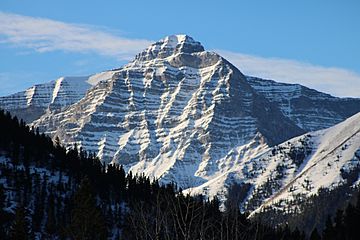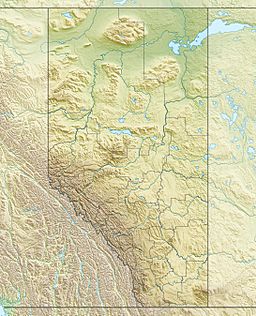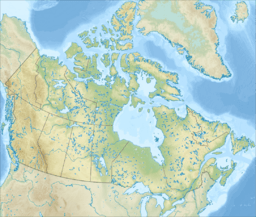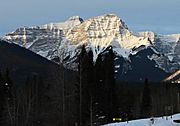Ribbon Peak facts for kids
Quick facts for kids Ribbon Peak |
|
|---|---|

Ribbon Peak seen with summit of Mount Bogart directly behind
|
|
| Highest point | |
| Elevation | 2,880 m (9,450 ft) |
| Prominence | 228 m (748 ft) |
| Parent peak | Mount Bogart (3144 m) |
| Listing | Mountains of Alberta |
| Geography | |
| Location | Alberta, Canada |
| Parent range | Kananaskis Range Canadian Rockies |
| Topo map | NTS 82J/14 |
| Geology | |
| Age of rock | Cambrian |
| Type of rock | Sedimentary |
| Climbing | |
| First ascent | 1957 Crickard, Higgins, Gmoser |
| Easiest route | Scrambling with exposure via south ridge |
Ribbon Peak is a mountain located in Kananaskis Country in the Canadian Rockies of Alberta, Canada. It stands about 2,880 meters (9,449 feet) tall. Ribbon Peak is close to another mountain called Mount Bogart, which is about 1.0 kilometer (0.6 miles) to the southwest.
This peak is also about four kilometers northwest of Mount Kidd. You can easily see both Ribbon Peak and Mount Kidd from Highway 40, especially near the Kananaskis Village junction.
Exploring Ribbon Peak
The first people known to have climbed Ribbon Peak were F.W. Crickard, R. Higgins, and their guide Hans Gmoser. They reached the top in 1957.
In June 1986, an airplane crash happened near the mountain. To remember those who were lost, three lakes on the north side of Ribbon Peak were named Memorial Lakes.
How Ribbon Peak Was Formed
Ribbon Peak is made of sedimentary rock. This type of rock forms from layers of sand, mud, and tiny bits of sea creatures that settle at the bottom of ancient seas. These layers were laid down over millions of years, from the Precambrian to the Jurassic periods.
Later, during a time called the Laramide orogeny, huge forces pushed these rock layers. They were pushed east and even slid over younger rocks, creating the mountain shapes we see today.
Weather Around Ribbon Peak
Ribbon Peak has a subarctic climate. This means it has very cold, snowy winters and mild summers. Temperatures can drop below −20 °C (–4 °F), and with wind, it can feel even colder, sometimes below −30 °C (–22 °F).
The best time to visit or climb Ribbon Peak is usually from July through October. During these months, the weather is more pleasant and suitable for outdoor activities.
Any rain or melting snow from the mountain flows into Ribbon Creek. From there, the water eventually reaches the Kananaskis River.




